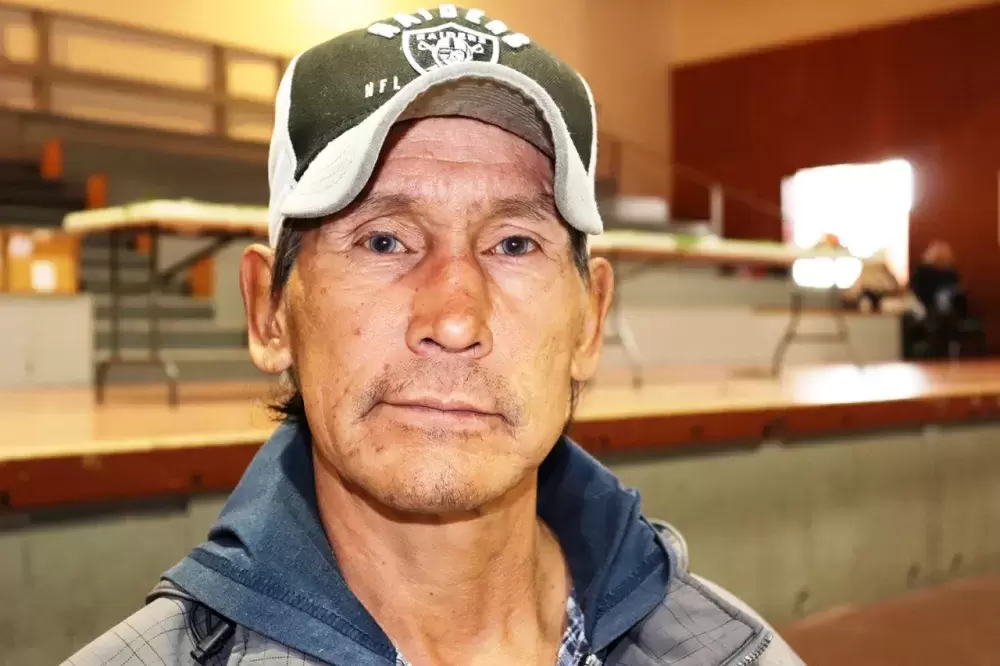“I was only seven years old when we were loaded on the bus – I didn’t know why me and my older brother were being taken away from our parents,” said Clyde Wale of Hazelton B.C.
Wale, now 54, was in Port Alberni on the weekend of Sept. 27 for the Reclaiming Lost Souls Healing event hosted by Tseshaht First Nation. Clyde spent one year at the Alberni Indian Residential School, starting in September 1972.
He recalled that two buses were loaded in his home community. The kids, he said, were from surrounding communities. He didn’t know any of them.
“I don’t know why they took us away – there was a day school there,” said Wale. “DIA (District of Indian Affairs) was the ones that did it; maybe it was because my dad was an alcoholic.”
Wale didn’t recall ever leaving the bus. He believes they drove the 1,400-kilometres straight through to Port Alberni. When they arrived he saw the white-brick building that would be his dorm for the next year.
“They lined us up and put delouser in our hair – you didn’t want to get that stuff in your eyes,” he said.
Then his long hair was shaved off and he was changed into AIRS-issued clothing.
“I felt abandoned, unwanted, and worthless – I felt ashamed,” said Wale. “They called us savages, put soap in our mouths because they thought we were laughing at the supervisors.”
Wale shared that one of his friends was in so much anguish that he hung himself at AIRS.
At the time the AIRS dorms were divided into three floors; the junior boys were on the main floor, the intermediate on the second, and the senior boys on the top floor. It was late one night when Wale remembered being woken up by a female supervisor.
“It was a young woman supervisor – she decided to take us to Parksville for a picnic,” he recalled.
But it was late at night and the van load of children never made it to Parksville.
“We had a bad accident at that lake just over the mountain,” he said.
Judging from his description, the accident likely happened at Cameron Lake near Angel Rock.
“We hit the rock and there was yelling and screaming – bodies flying everywhere,” he recalled. “A kid in the back died and my friend Alex, from Kispiox, lost his arm.”
The survivors were rescued by a passerby.
“It’s lucky we didn’t end up in the lake or they wouldn’t have found us,” he said.
Wale said he suffered cuts on his head and wrist.
A search of online archives shows that an eight year-old Ditidaht boy died instantly in a crash on Highway 4, at Cameron Lake on November 11, 1972. The record indicates that David Edwards was in a bus, which ‘ran off the road’.
Wale never returned to Port Alberni until 2019. He said he went on to Lytton Indian Residential School and eventually returned to his father, whom he said took better care of him and his brother. But he admits he turned to alcohol very young.
“I took my first drink at age 12, a shot of vodka from his older cousins,” he said.
He remembered that it burned going down and he wound up passing out. He felt horrible when he woke up alone, on the floor, and thought he would never touch alcohol again, but he returned to it five years later.
He has heard the stories of other residential school survivors and likes to hear how they’ve coped.
“I am happy to be here,” he said. “We have to take back our spirits and when I go home, I am going to leave this stuff behind.”
“When I leave here it is imperative that I stay away from town and stay busy,” he said, vowing to live a sober life.
Wale plans to make his living cutting firewood for the elders. “We get lots of snow up north,” he said.







